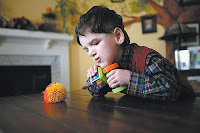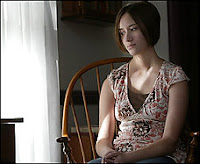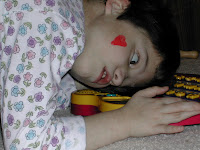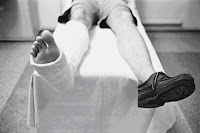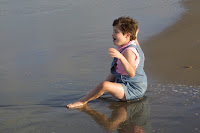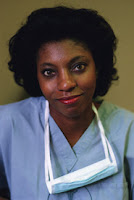
For the most part, I have been very blessed to find medical professionals who do an excellent job of providing care and offering support to Ashley. I can say without a doubt that most of the doctors and other healthcare staff we see have never treated a child with Ashley’s unique combination of disabilities. They have been very open, however, to research on her disabilities and to listening to me.
None of the doctors we see, and there are quite a few, have ever told me that they have treated another child with deafblindness. They all have said they have never treated a child with juvenile xanthogranulomas, a condition that causes tumors to form – on vital organs, on the skin, under the skin, on Ashley’s eyes and ears. She has already had two brain tumors removed and her gall bladder removed due to a tumor. Even the dermatologist we see had to look up the condition in her medical reference book, a book which detailed it as an extremely rare condition and based on its description in the book, Ashley had one of the worst cases ever documented. Throw into that mix ADHD, fetal alcohol syndrome, and a few other things, and doctors find themselves treating a very unique child. And, they are doing a wonderful job! But, I have learned some lessons along the way that have made it easier for the doctors and nurses to do their jobs, easier for me to provide the daily care that Ashley needs, and most importantly, easier on Ash. I will share some of those things in the list below, but I would love to hear from others about the lessons they have learned in parenting their children with disabilities.
1. Always be honest with your child about what is going on and about what is going to happen to them. Communicate, communicate, communicate – even if you think your child isn’t understanding what you say. The tone of your voice, your calm approach, your soothing hands will all help to keep your child calm during medical visits and procedures. I always tell Ashley (with both my voice and sign language) when we are going to the doctor and why we are going to the doctor. I also will touch the parts of her body that the doctor will want to see or touch. For instance, if we are going for a visit to check on an ear infection, I will touch her ear and tell her that the doctor is going to look in it. I will tell her that nothing on that particular visit will hurt. However, if I do expect a procedure where something will hurt or be invasive, I do tell her. When it is time for shots, I say and sign that she is going to get a shot and that it is going to hurt for a minute. I tell her that before we get to the doctor’s office, and I tell her again just before the shot is administered. I tell her it is ok to say ‘Oooow’ or to cry. Never let your child be surprised.
2. Practice what might happen when visiting the doctor. For instance, when Ash was younger, she was very reluctant to let the doctor look in her mouth. She wouldn’t say ‘Ahhh’, but would in fact clamp her mouth shut. So, when we were not at the doctor’s, we would practice opening our mouths and saying ‘Ahhh’. It turned into a fun game, and the next time we visited the doctor, Ashley had no problem sharing her new skill. We have also practiced taking deep breaths – the kind of breaths doctors need a child to take when they are listening to their lungs. Again, practice at home, make a game of it, and the next doctor’s visit will be an opportunity to ‘play’ that game.
3. If your child is deaf and/or blind, make sure the doctor understands that you will need to help communicate. The doctor should talk about everything that he or she is going to do, and then as a parent you can communicate that to your child in the way you feel is most effective. The doctors we see never rush, but if you do have a ‘quickie’ doctor, insist that they slow down enough for you to communicate to your child what is going to happen. If your child is sensory defensive and doesn’t like to be touched in certain ways or by certain people, let your doctor know that up front. Instruct the doctor on the best way to approach your child. I honestly believe a good doctor will appreciate the information because it will make their job so much easier.
4. Don’t allow a doctor or nurse to talk to your child as if he or she is a baby (unless of course, they are a baby!). Nothing rankles me more than to have a doctor or nurse talk in baby talk to my twelve year old. You may have to sweetly remind the professional that your child is almost a teen and that she will understand better if spoken to in an age appropriate manner.
5. Unless you know for a fact that your doctor always stays on schedule, taking a bag or backpack of your child’s favorite toys, books and games can help pass the time and prevent an impatient meltdown.
6. If your child has to stay overnight in the hospital, make a sign to put either on the hospital room door or on the hospital bed that explains in short, concise language how best to work with your child. For instance, I put on Ashley’s sign the fact that she is deafblind and that no one should just walk up and start touching her without announcing themselves to her first. I also list things like “champion IV remover”, “escape artist”, and other descriptive things about Ashley that may not be reflected in her medical chart. Hospital staff changes constantly, and you may not always be there to explain these special situations to them.
7. Does your child often have medical problems which require an ambulance come to your home to transport her/him to the emergency room? If so, make sure you have important information like insurance info, medications, and specific medical conditions documented and within easy reach. I keep two sheets of paper that contain all that information as well as the name and phone number of every medical specialist that Ashley sees in an envelope taped to the back of my front door. When the ambulance staff or fire department staff (they are often the first responders in my area) arrive, I can hand them that envelope and they have all the information they need. I have also made a small book of sign language signs that the first responders will likely see when they are helping Ashley. If your child communicates via a method other than speech, you should consider how you are going to facilitate that communication in a stressful situation involving ambulances.
8. And finally, another tip I have learned regarding emergency room visits, if you take your child to the emergency room yourself, you may have to wait a long time to be seen. You will be sitting in the waiting room with a lot of other ill or injured people. The stress level of that combined with whatever issue brought you to the emergency room will almost guarantee a meltdown by your child. And, my experience is that emergency room staff doesn’t always care if there is a meltdown. It will NOT get you seen any sooner. However, if an ambulance brings your child to the emergency room, they are taken immediately back to the ER treatment area and not left to sit in the waiting room. Given the seriousness of your child’s issue as well as their response to the long wait in the waiting room, calling an ambulance might be something you want to consider.
I’ll stop the list here, but again, I would love to hear from other families about the tips they may have. There are many difficult times that families will face when one of their family members has special needs, and finding appropriate medical care is one of the most critical. As I said at the start, I have been very blessed to find a cadre of wonderful doctors and nurses. My final tip is, when you find someone that is wonderful, make sure to thank them over and over again!!!
